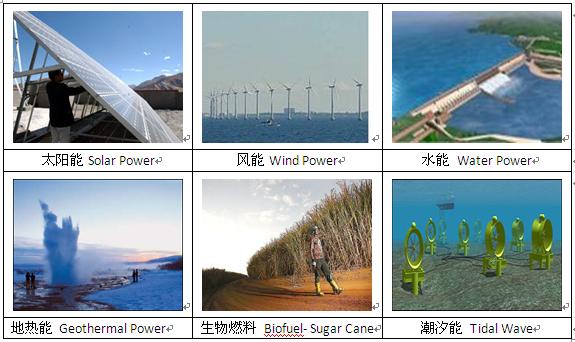
Due to global warming, natural disasters caused by extreme weather conditions have occurred one after another. Ecological changes caused by environmental pollution and its impact have worsened day by day. If current situation continues, the earth environment which mankinds have been relying on for existence will cease to exist. Furthermore, our pursuit for modern civilization and material comfort resulted in astoundingly high energy consumption. According to the latest statistics from International Energy Agency, globally the remaining recoverable reserves of oil will last only 40 years, natural gas 60 years, and coal just over one hundred years.
In the face of the double threats of environmental crisis and energy crisis, developing alternative clean energy, protecting environment, and preserving our earth have become the responsibility of all mankind, and a goal which the entire world should jointly work to achieve.
Clean energy refers to the energy which generates little emission and pollution during energy production and consumption, such as nuclear, water, geothermal power, and so on. Clean energy also includes renewable energy such as solar power, wind power, biofuel, etc. Simply speaking, clean energies are the forms of energy which are environmentally friendly.
Among various forms of clean energy, because of their safe and clean nature, solar power, wind power, water power, geothermal power, and biofuel have been widely recognized and promoted to use in many countries of the world. The following snapshots of utilization example in some countries clearly show the broad prospects of future development of clean energy.
Solar power is a form of direct-use, non-polluting, renewable clean energy. It is estimated that the solar power derived from the Sun in one day is enough for the whole world to use for 40 years. RiZhao City, located in Shandong Province, China, with a population of three million people, has abundant sunshine year round. “RiZhao” means "sunshine" in Chinese. Taking advantage of the cheap, convenient, and clean solar power, the city now can meet its heating and cooling needs. In RiZhao city, over 99% of the residents are getting their hot water supply from solar energy.
The wind blowing freely around us is nature's gift in the form of clean and renewable energy. Denmark, known as the fairy tale kingdom, has been at the forefront of wind power production and utilization. So far, Denmark has been operating 5,200 wind turbines, generating 20% of the nation's total energy, and this number is likely to reach 50% or even 75% by the year 2025. By then, Denmark will become a “wind-driven” country.
Water power is presently the most widely used renewable energy in the world. 24 countries such as Brazil and Norway now receive 90% of their energy supply from hydroelectricity, and 55 countries such as Canada, Switzerland, and Sweden, receive 50% of their energy supply from hydroelectricity. Compared to hydro energy on the land, the hydro energy from the ocean is much more abundant. In recent years, the development and utilization of ocean hydro energy such as tidal power and wave power have been actively carried out by countries all over the world.
Geothermal energy is derived from heat in the Earth's core. It is estimated that the heat rising to the earth's surface from deep inside the earth every year probably equals the energy yielded from burning 100 billion barrels of petroleum. Iceland has the most abundant geothermal resources in the world, and its capital "Reykjavik" means "steam beach" in Icelandic. Since a large-scale use of geothermal resources in 1975, Iceland has already reached the international standard of greenhouse gas emission decades ahead of time, and become one of the cleanest countries in the world. Now Iceland is planning to soon be the first country in the world to use solely renewable clean energy.
As the saying goes: “All living things depend on the sun for their growth.” Bio-energy is the solar energy stored inside the living beings in the form of chemical energy. Being the largest sugarcane planter in the world, Brazil has utilized sugarcane as the raw material to produce ethanol. According to a study by Cambridge Energy Research Associates in Rio de Janeiro, ethanol fuel has already replaced 40% of the nation's gasoline consumption, bringing significant economic gains and environmental protection benefit to Brazil.
|